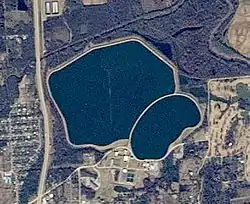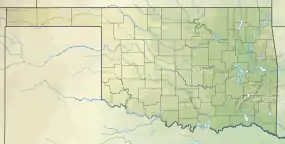Lake Yahola (Oklahoma)
Lake Yahola is a reservoir in Tulsa, Oklahoma. The reservoir was completed in 1924. Its primary purpose is to store raw water for treatment and distribution. This city-owned, 2-billion-US-gallon (7,600,000 m3), concrete-lined lake is an integral part of the Tulsa water supply, and receives water by pipeline from Lake Spavinaw. It is located in Mohawk Park, adjacent to the Mohawk Water Treatment Plant.
| Lake Yahola Dam | |
|---|---|
 Lake Yahola seen from the ISS | |
 Location within Oklahoma | |
| Country | United States |
| Location | Tulsa, Oklahoma |
| Coordinates | 36.2184266°N 95.923605°W |
| Status | complete |
| Opening date | 1924 |
| Owner(s) | City of Tulsa |
| Dam and spillways | |
| Elevation at crest | 603.52 ft (183.95 m)[1] |
| Reservoir | |
| Creates | Lake Yahola |
| Total capacity | 2 billion US gallons (7,600,000 m3) nominal |
| Surface area | 431 acres (1.74 km2) [2] |
Lake description
The lake covers 437 acres (1,770,000 m2) and has an average depth of 18.5 feet (5.6 m).[3]
The original water treatment plant, designed to process 90 million gallons per day (MGD), went into service in 1929. It was replaced in 1998 by a new plant designed to process 100 MGD. The Mohawk plant has been expanded to a design capacity of 200 MGD[4]
Recreation
Lake Yahola also serves as a recreation site, with facilities for boating and fishing.[3] However, the Oklahoma Department of Wildlife Conservation states that the docks are closed to the public and that boating is not allowed. Fishing from sites along the shore is allowed.[5]
The adjacent Oxley Nature Center is a popular place for bird watching.[6]
References
- "Yahola Dam - Tulsa, OK". quickcityinfo.com. Retrieved 4 September 2015.
- Bostian, Kelly. Tulsa World. "Where to fish: Local ponds." 22 May 2011. Retrieved 28 Jun 2011
- "Oklahoma! Lake Yahola" Archived 2011-04-26 at the Wayback Machine
- "Water - The City of Tulsa Online". cityoftulsa.org. Retrieved 4 September 2015.
- Oklahoma Department of Wildlife Conservation. "Yahola Reservoir." Retrieved September 28, 2012
- "Oxley Nature Center". tulsaaudubon.org. Retrieved 4 September 2015.
